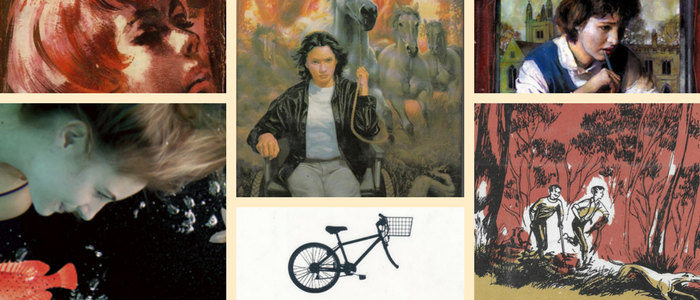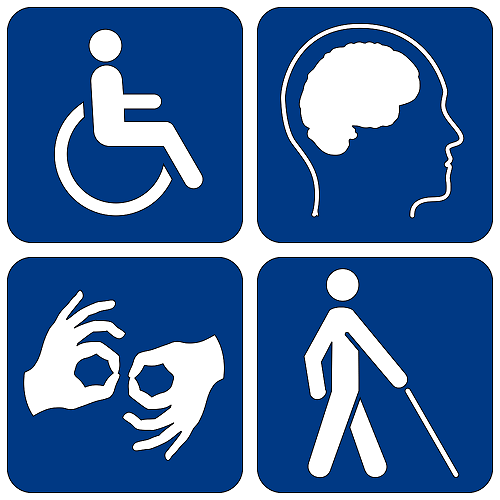AustLit
-
Clockwise from top left: Patricia Carlon (Danger in the Dark; Ward, Lock, 1962), Colin Thiele (Jodie's Journey; Walter McVitty Books, 1988); John Marsden (So Much to Tell You; Walter McVitty Books, 1987); Alan Marshall (I Can Jump Puddles; World Publishing, 1957); J. M. Coetzee (Slow Man; Viking, 2005); Kathryn Lomer (Talk Under Water; UQP, 2015).
-
Welcome to Writing Disability in Australia
-
Writing Disability in Australia aggregates writing on disability in AustLit into a searchable index, with the aim of drawing attention to the ways in which Australian writers have represented disability. It highlights the significant and imaginative achievements of writers with disability, the structures and assumptions of ableism, the resourcefulness with which people with disability navigate their everyday lives, and the ways in which disability lends itself to creativity, lateral thinking, and resilience.
Writing Disability in Australia promotes the social model of disability, which sees disability as a condition created by barriers in culture and environment. It does not perceive disability as something to be ‘fixed’; rather, it emphasises the removal of these barriers so that people with disability can participate in society on an equal basis.
Our definition of a person with a disability is guided by the United Nations Convention on the Rights of Persons with Disabilities: 'Persons with disabilities include those who have long-term physical, mental, intellectual or sensory impairments which in interaction with various barriers may hinder their full and effective participation in society on an equal basis with others.'
-
Records affiliated with the Writing Disability in Australia project are identified by the following icon, which appears to the right of work and agent records:
-
Records also include a table that tracks the following information:
Type of disability E.g., temporary paralysis Type of character E.g., primary, secondary, incidental Point of view E.g., first person, third person -
There are two modes for searching this database. One is by form or genre, which reflects the varied and creative contributions people with disability have made to Australian literature. For example, life writing illuminates personal experiences of disability; fiction represents characters with disability in either major or minor roles; young adult literature captures the experiences of growing up with a disability; and poetry compresses the experiences of disability into rich imagery that captures the imagination.
The links below deliver search results from the AustLit database. -
Life Writing Fiction (ex. speculative fiction) Non-fiction YA Fiction and Children's Fiction Speculative fiction (fantasy, horror, and science fiction) Poetry Drama Film/TV Graphic novels -
The other mode of searching is by the type of disability. We are very aware that this approach may be viewed as problematic given the history of classifying people with disability as objects, rather than as subjects and active participants in society. However, the nature of the database invites us to explore the thesaurus of disability (see The Thesaurus of Disability in left-hand menu).
-
Writing Disability in Australia is still in progress, but the link below will allow you to explore records currently affiliated with this dataset.
Note: The search results will open in reverse-date order, showing most recently published material first. Results can be filtered using the tabs on the left (for example, limit to works by women writers) or reorganised using the drop-down menus along the top (for example, organise them alphabetically).
-
Project Lead: Dr Jessica White
Dr Jessica White is a lecturer and researcher at The University of Queensland, where she is writing an ecobiography of 19th century botanist Georgiana Molloy. She is the author of A Curious Intimacy (Penguin/Viking 2007) and Entitlement (Penguin/Viking 2012), and her short fiction, essays and poetry have won awards and shortlistings and appeared in a wide range of literary journals. Jessica is also the recipient of funding and residencies from Arts Queensland and the Australia Council for the Arts. In 2019, she published Hearing Maud (UWAP), a hybrid memoir that describes the intertwining of her life with that of Maud Praed, the deaf daughter of 19th century Queensland novelist Rosa Praed. Jessica has been severely-to-profoundly deaf since she was four.
Dr. Dylan Holdsworth (Disabilities and Dystopias)
Dr. Dylan Holdsworth completed his PhD at Deakin University, Melbourne, in 2017. His PhD project explored representations of disability in dystopian children’s literature across history, with a specific focus on how disability is constituted in relation to power. He has published two book chapters in 2017: 'More than Puddles: Disability and Masculinity in Alan Marshall’s I Can Jump Puddles' in Disability and Masculinities: Corporeality, Pedagogy and the Critique of Otherness, and 'Conceal, Don’t Feel’: Disability, Monstrosity, and the Freak in Edward Scissorhands and Frozen' in Affect, Emotion, and Children’s Literature: Representation and Socialisation in Texts for Children and Young Adults. His research interests include disability, science fiction, dystopian literature, horror cinema, children’s and young adult literature, and Australian literature.
Research Assistant (Semester 1, 2018): Alice Chong
Alice Chong was an undergraduate student at The University of Queensland studying a Bachelors of Economics/Arts, majoring in English Literature and Writing, as well as a Diploma of Languages, when she worked as an intern on the WDA. She was the project's first research assistant, helping to build the dataset, source works, and creating abstracts.
Research Assistant (Semester 2, 2018): Acacia Pohlner
Acacia Pohlner was an undergraduate student at The University of Queensland when she worked as an intern on the WDA. During her internship with AustLit, Acacia was a research assistant to Jessica White and worked on the Writing New Waves exhibition on surfing and disability.
Research Manager: Dr Catriona Mills
Dr Catriona Mills began work with AustLit in 2010, and has since worked on a range of research projects. She holds degrees from Macquarie University and The University of Queensland, and has published on adaptations of penny-weekly serials to the English suburban stage, authorship attribution in Australian nineteenth-century periodicals, steampunk, and Doctor Who.
You might be interested in...






